Related Research Articles

The English Civil War was a series of civil wars and political machinations between Royalists and Parliamentarians in the Kingdom of England from 1642 to 1651. Part of the wider 1639 to 1653 Wars of the Three Kingdoms, the struggle consisted of the First English Civil War and the Second English Civil War. The Anglo-Scottish War of 1650 to 1652 is sometimes referred to as the Third English Civil War.

1651 (MDCLI) was a common year starting on Sunday of the Gregorian calendar and a common year starting on Wednesday of the Julian calendar, the 1651st year of the Common Era (CE) and Anno Domini (AD) designations, the 651st year of the 2nd millennium, the 51st year of the 17th century, and the 2nd year of the 1650s decade. As of the start of 1651, the Gregorian calendar was 10 days ahead of the Julian calendar, which remained in localized use until 1923.
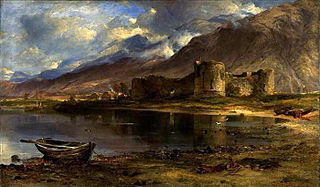
1645 (MDCXLV) was a common year starting on Sunday of the Gregorian calendar and a common year starting on Wednesday of the Julian calendar, the 1645th year of the Common Era (CE) and Anno Domini (AD) designations, the 645th year of the 2nd millennium, the 45th year of the 17th century, and the 6th year of the 1640s decade. As of the start of 1645, the Gregorian calendar was 10 days ahead of the Julian calendar, which remained in localized use until 1923.

Sir Oliver St John was an English barrister, judge and politician who sat in the House of Commons from 1640-53. He supported the Parliamentary cause in the English Civil War.

The Wars of the Three Kingdoms were a series of conflicts fought between 1639 and 1653 in the kingdoms of England, Scotland and Ireland, then separate entities in a personal union under Charles I. They include the 1639 to 1640 Bishops' Wars, the First and Second English Civil Wars, the Irish Confederate Wars, the Cromwellian conquest of Ireland and the Anglo-Scottish War of 1650–1652. They resulted in the execution of Charles I, the abolition of monarchy, and founding of the Commonwealth of England, a unitary state which controlled the British Isles until the Stuart Restoration in 1660.
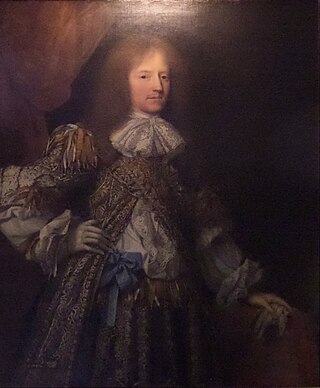
John Granville, 1st Earl of Bath PC was an English landowner who served in the Royalist army during the First English Civil War and was rewarded for his services after the 1660 Stuart Restoration with a title and various appointments.
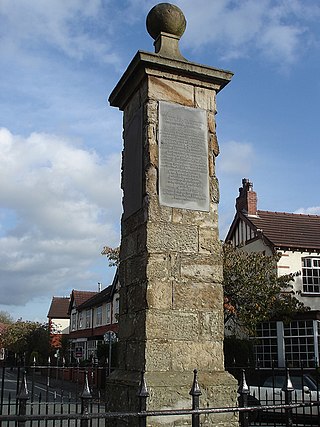
The Battle of Wigan Lane was fought on 25 August 1651 during the Third English Civil War, between a Royalist army led by the Earl of Derby and forces loyal to the Commonwealth of England under Colonel Robert Lilburne. The Royalists were defeated, losing nearly half their officers and men.

Sir William Lockhart of Lee (1621–1675), was a Scottish soldier and diplomat who fought for the Covenanters during the 1638 to 1651 Wars of the Three Kingdoms. Following Royalist defeat in the 1642 to 1647 First English Civil War, Lockhart took part in negotiations between Charles I and Scottish Engagers, who agreed to restore him to the English throne.
William Widdrington, 1st Baron Widdrington was an English landowner and politician who sat in the House of Commons from 1640 to 1642 and was created a peer in 1643. He fought in the Royalist army in the English Civil War and was killed in battle in 1651.
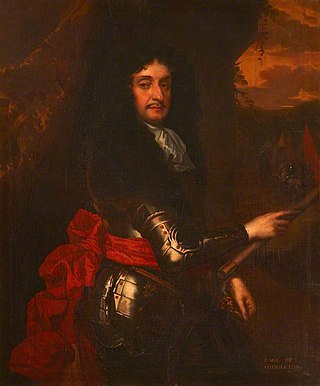
John Middleton, 1st Earl of Middleton was a professional soldier and mercenary from Kincardineshire in Scotland. Beginning his career in the Thirty Years War, during the Wars of the Three Kingdoms he fought for the Covenanters and Parliamentarians until 1648, when he switched sides to the Royalists.
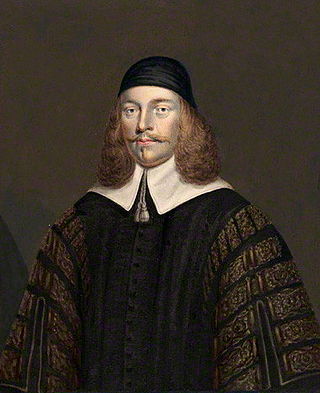
Sir Thomas Widdrington SL was an English judge and politician who sat in the House of Commons at various times between 1640 and 1664. He was the speaker of the House of Commons in 1656.
Thomas Wentworth, 5th Baron Wentworth, KB, PC was an English landowner and soldier who supported the Royalists during the Wars of the Three Kingdoms. At the end of the First English Civil War in 1646, he accompanied the future Charles II of England into exile and fought with him at the Battle of Worcester in 1651.

James Compton, 3rd Earl of Northampton FRS, was an English peer, politician and author, who fought for the Royalists during the First English Civil War.
Events from the year 1639 in England.
Events from the year 1640 in England.
Events from the year 1642 in England, opening year of the English Civil War and Wars of the Three Kingdoms.
Events from the year 1648 in England. The Second English Civil War begins.
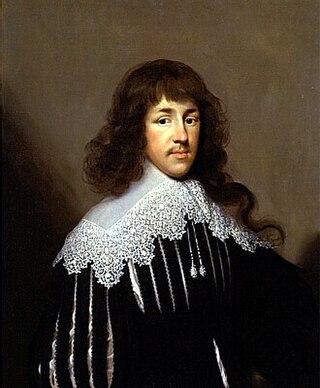
Sir Francis Godolphin MP, of Godolphin in Cornwall, was an English nobleman, landowner, politician, and Member of Parliament. His chief claim to fame is that he was the dedicatee of Hobbes' Leviathan.
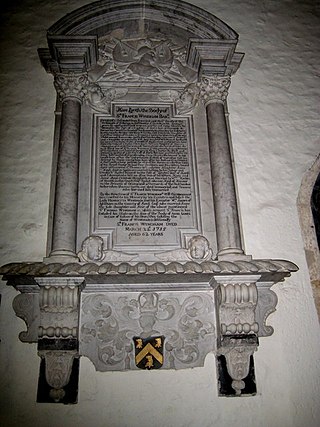
Sir Francis Wyndham, 1st Baronet of Trent, Dorset was an English soldier and politician who sat in the House of Commons of England at various times from 1640 until his death in 1676. During the First English Civil War, he served as a colonel in the Royalist army and helped Charles II of England escape to France after his defeat in the 1651 Third English Civil War.
The following outline is provided as an overview of and topical guide to the wars of the Three Kingdoms:
References
- 1 2 3 "1651". British Civil Wars, Commonwealth and Protectorate,1638-60. 2010. Archived from the original on 2012-02-18. Retrieved 2012-10-27.
- 1 2 "1651: The Scilly Isles". British Civil Wars, Commonwealth and Protectorate,1638–60. 2010. Archived from the original on 2012-02-25. Retrieved 2011-08-24.
- 1 2 Palmer, Alan; Palmer, Veronica (1992). The Chronology of British History. London: Century Ltd. pp. 185–186. ISBN 0-7126-5616-2.
- ↑ Keay, Anna (2023). The Restless Republic. London: William Collins. p. 153. ISBN 978-0008282059.
- ↑ The Hutchinson Factfinder. Helicon. 1999. ISBN 1-85986-000-1.